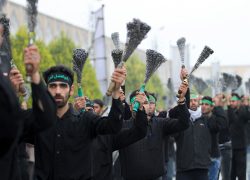Archive Iran

The history of the development of the city of Isfahan
As the third largest city in Iran, after Tehran and Mashhad, Isfahan is located in the center and heart of Iran.

Naqqāli, Iranian Dramatic Story-Telling:
The Oldest Dramatic Performance
Naqqāli is the oldest form of dramatic performance in the Islamic Republic of Iran and has long played an important role in society, from the courts to the villages.

Wedding Traditions in Isfahan:
The Brides of Isfahan
Women of the boy’s family choose a girl for him and then go to her family’s house in order to meet the girl and become more familiar with each other.

Nawrouz, Novruz, Nowrouz, Nooruz,...
A World Heritage New Day
March 21 marks the start of the year in Afghanistan, Azerbaijan, India, Iran (Islamic Republic of), Iraq, Kazakhstan, Kyrgyzstan, Pakistan, Tajikistan, Turkey, Turkmenistan and Uzbekistan.

Pahlevani and Zoorkhanei Rituals:
World of Chivalry
Pahlevani is an Iranian martial art that combines elements of Islam, Gnosticism and ancient Persian beliefs.

The Figures of Isfahan: Fazlollah Dahesh
The Light
In 1305 SH, he founded the first electricity company of Isfahan at Telefonkhaneh Alley, Darvazeh Dowlat, and so the first lamps of the Chehel-Sotoun Palace and its surrounding streets were lit by the Dahesh Factory.

Foreign Travel Writers in Isfahan: Engelbert Kaempfer
The Ladies’ Street
Engelbert Kaempfer, the German physician and traveller who travelled to Iran at the time of Shah Suleiman’s coronation, recounted what he saw in his travelogue.

Isfahan's Heritage: Jahan Hotel
The Most Modern Hotel of Isfahan in the Pahlavi Era
Jahan Hotel, which had started working much before the Abbasi Hotel, continued its activities up until the 60s (SH), yet was suddenly abandoned.

Isfahan's Heritage: Chaharbagh
The Most Familiar Path
Isfahan’s Chaharbagh was the busiest passage of the city up until a few decades ago and not just a place to pass along, but one to stay in and visit friends at.

Foreign Travel Writers in Isfahan: Pierre Loti
A Skirt Full of Roses
Up until a hundred years ago, Isfahan’s rose was world famous so much so that a world traveler such as Pierre Loti would take the trouble of going all the way from Champs-Élysées to Chaharbagh.

Isfahan's Heritage: The Abbasi Jame Mosque
The Marble Stones of the Mosque
When a shortage of marble was faced during the construction of the Abbasi Jame Mosque, Shah Abbas ordered them to compensate for it by removing and reusing the marble stones of the Atiq Jame Mosque.

Isfahan's Intangible Heritage: Hospitality
A Royal Traveller to Isfahan
The murals on the ceiling of one of the rooms in the northern hall of the Chehel Sotoun Palace is different from the rest.




